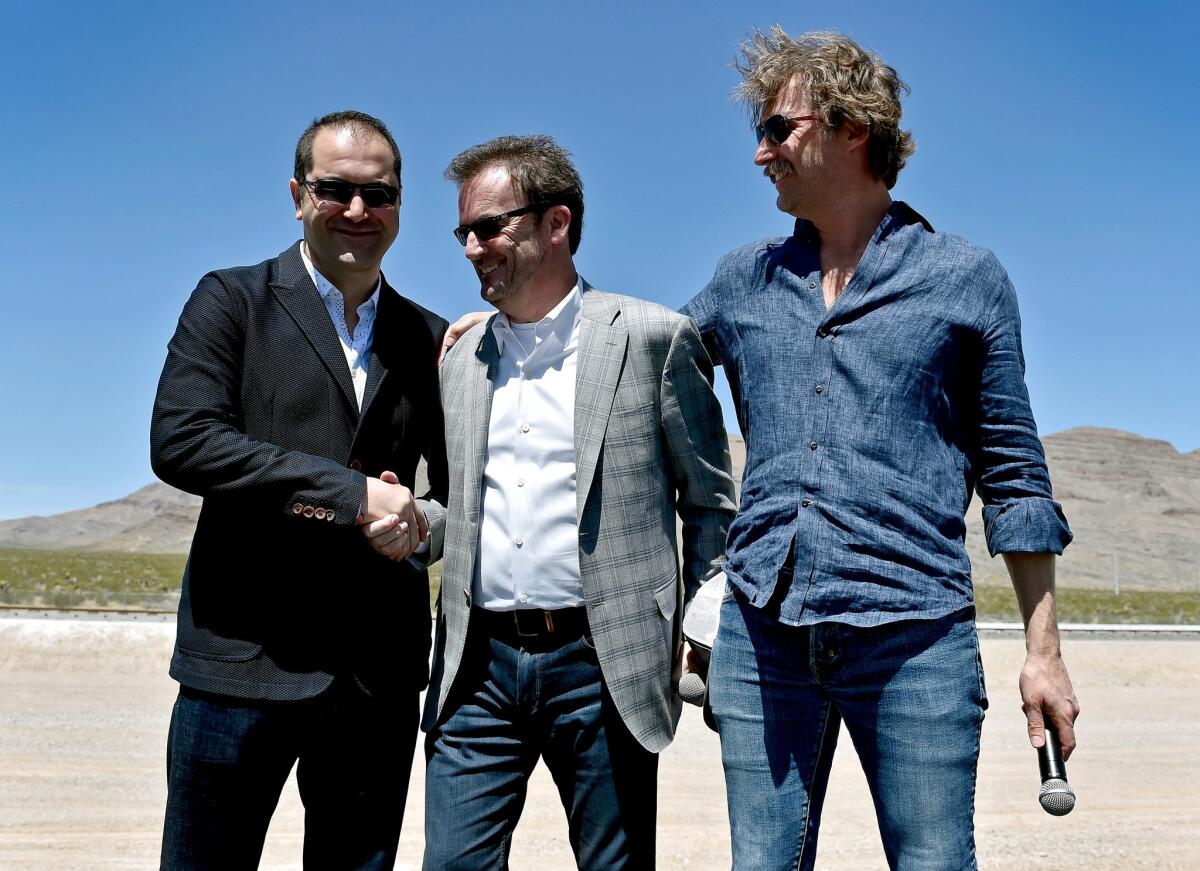Hyperloop One is in a massive legal fight. Do investors deserve some blame?

- Share via
Venture capitalist Shervin Pishevar made a bold promise two years ago as he sought funding for his new Los Angeles company, Hyperloop Technologies Inc.
He would put $40 million of his fortune into the high-tech transportation start-up as soon as Uber Technologies or other companies in which he had invested went public.
For the record:
7:20 p.m. Aug. 13, 2016An earlier version of this article included Airbnb among the companies in which Shervin Pishevar held investments when he committed some of his fortune to Hyperloop Technologies Inc. He invested in Airbnb after making this pledge.
At that point, Pishevar and colleagues had only an idea to sell: Their take on entrepreneur Elon Musk’s concept of blasting passengers across vast distances inside low-friction tubes. But Pishevar’s pledge energized investors, who went on to give $10 million to Hyperloop One — and later $90 million more.
With the financing, investors showed their faith in Pishevar, the co-founder, initial funder and executive chairman. Now the question is whether they trusted him too much.
A lawsuit last month alleged that Pishevar used Hyperloop Technologies to pad his own venture fund and give family and friends jobs. The plaintiffs say engineering efforts took a back seat to marketing. And an internal dispute about how much authority employees should have over management culminated with Pishevar’s brother, the company’s general counsel, leaving a rope tied like a noose at a colleague’s desk.
The company calls the claims exaggerated and false, describing them as a last-ditch effort by a gang of four former high-ranking but underperforming employees who lodged a failed internal mutiny and want their jobs back. It’s seeking $250 million from them in a countersuit.
The discord, which included the exit of co-founder and Chief Technology Officer Brogan BamBrogan, produced weeks of angst inside the firm. Though many shareholders and business partners say Hyperloop One remains on track, even investors and collaborators acknowledge something went amiss.
“I invested in a company that brought some of the smartest people together to do something amazing,” said Martin Ringlein, venture partner at investment firm NextGen and chief executive of ticketing software company Nvite. “I strongly believe the smartest people in the room will continue to make the best decisions moving forward; I just hope that those are the ones still in the room.”
Start-up financing experts say investors may deserve some blame. Depending on how the allegations shake out, Hyperloop One could become the latest illustration of what can happen when investors enable a permissive atmosphere, one that allows businesses to lean too far into a Silicon Valley culture that values rapid development over corporate norms.
“We may have become too lax in terms of the decision-making process,” said Ken Sawyer, managing director at Saints Capital, which purchases start-up shares but does not hold stakes in Hyperloop One. “Now that we’ve seen another case that could — and that’s could — be evidence of tilting too far, you have to ask, ‘Are quick, fast decisions, getting stuff done, being rewarded over proper governance and direction?’”
Are quick, fast decisions, getting stuff done, being rewarded over proper governance and direction?
— Ken Sawyer, managing director at Saints Capital,
The lawsuit could have ramifications. Academics say legal issues, poor governance and a dominant shareholder can hurt a company’s valuation. Partners may be scared away too.
“We don’t want to taint our project with their project,” said Richard Mueller, chief operating officer of Grid Logistics, a Los Angeles start-up seeking to build an underground train to move cargo across the Southland. It is partnering with Hyperloop One and Aecom on a joint research venture Arcturan Sustainable Cargo, but “the personalities they have involved and the lawsuits they have going back and forth, I am concerned,” Mueller said.
In court papers, Hyperloop One says it is in a “race” to develop the new transport medium. At least one other major U.S. company is publicly pursuing the same vision.
To win, Hyperloop One has moved rapidly, approaching 200 employees within two years and building out expansive offices and fabrication facilities in Los Angeles and Nevada.
But the lawsuit calls into question decisions along the way. Was hiring Pishevar’s brother, a veteran criminal defense attorney, as corporate counsel a shrewd, low-cost move or an act of nepotism? Was bringing in a board member’s investment-banker brother to handle fundraising a way to keep things close to the vest or a friendly bone thrown his company’s way? Were tours and parties at the office held to attract investors or to stoke Pishevar’s ego?
Hiring family members and doing business with friends invites scrutiny, but they are shortcuts used by start-ups seeking to minimize formalities and move fast.
The accusations are nowhere as egregious as other recent cases in tech. The blood-testing start-up Theranos overstated its capabilities, potentially endangering people’s health. And Zenefits, which provides services for managing employee healthcare benefits, encouraged employees to cheat their way through state licensing exams.
But to Sawyer, the Hyperloop One situation now presents “a great reminder, even if the actions were done appropriately, that … good governance does have value and we as venture investors need to find balance” between scrutinizing decisions and giving blanket green lights.
Venture capitalists generally stay away from day-to-day operations, though oversight and guidance is expected if not an implicit part of a deal.
That type of mentorship becomes more difficult as more foreign investors fund faraway start-ups.
Believed to be among the company’s largest financiers is Caspian VC, an entity launched by Russian oil and port logistics billionaire Ziyavudin Magomedov. Caspian recently helped Pishevar get facetime with Russian President Vladimir Putin and Hyperloop One a deal with Moscow to explore constructing a system there.
The support is great. But the firm’s investment would have been unusual a decade ago when venture capitalists refused to support companies they couldn’t bike to, said Matt Crowley, an Encino attorney who advises start-ups. The rule of thumb has expanded to a Southwest Airlines flight away, he said, but “folks coming out of China and Russia, you’d have to wonder how engaged they were on a month-to-month basis about what was going on on the ground.”
Anna Fang, chief executive at well-funded Chinese backer ZhenFund, said her firm did proper due diligence before investing in Hyperloop One and stays in touch regularly by phone, email and WeChat. Caspian didn’t respond to requests to comment.
Another issue across the industry has been funding rounds that dole out small stakes to many investors, with none feeling in control. At least one Hyperloop One investor described falling into that situation.
“We have such a tiny investment that I don’t think anyone here stays in real touch with them,” said Vinod Khosla, managing partner at Khosla Ventures, which has invested in rocket, clean energy and biotechnology companies.
Hyperloop One came together in an unusual way. The idea was made popular by Musk, the auto-and-rockets entrepreneur, whose imprimatur gave it instant credibility to investors. But Musk isn’t involved in any company pursuing it. Pishevar — a working VC, not an engineer — ran with the concept, handpicking BamBrogan to lead technical work.
BamBrogan hired on colleagues from his decade-plus at Musk’s rocket company SpaceX, and their collective pedigree likely boosted investors’ confidence. Pishevar’s investment pledge and outsized role also would helped mitigate risk among investors debating whether to get in. Pishevar was one of them, and he seemed highly committed to the project.
“It’s possible they trusted him” as a steward, Crowley said.
Stakeholders say disputes arise even at start-ups that have a more traditional start in a dorm room or tech incubator.
“It is not extremely uncommon to see fast-growing, high-profile start-ups facing disagreements amongst the management team and over the long-term vision of the company,” said ZhenFund spokesperson Tara Zhang.
Though a co-founder such as BamBrogan leaving a company isn’t unusual nor anywhere close to a sign of doom, that 10 high-ranking employees joined BamBrogan as signatories on an internal letter of grievances should give pause, two investors not involved with Hyperloop One said.
“If 11 employees of any portfolio companies write a letter to management, that’s a problem,” Sawyer said. “That’s a big issue. You take that super seriously as a board and as an investor group.”
If 11 employees of any portfolio companies write a letter to management, that’s a problem.
— Ken Sawyer, managing director at Saints Capital
For now, bullishness pervades. A couple of investors issued statements to The Times via email after Hyperloop One advised them to comment for this story.
One of them, Howard Milstein, a Hyperloop One investor and real estate and banking mogul, said through a spokesperson, “No one ever said this was going to be easy.”
Oliver Pietz, executive director for the Americas for Deutsche Bahn Engineering & Consulting, said he hopes to continue collaboration with Hyperloop One despite the issues.
Several investors declined to comment, including Pishevar, Eniac Ventures, GE Ventures, fashion model Amber Arbucci and Tinder dating app co-founder Justin Mateen.
Hyperloop One wrote in a statement that investors’ “belief in our team and technology have enabled us to remain focused on the task at hand: reinventing transportation.”
Twitter: @peard33
ALSO
Can’t afford the latest smartphone? You can lease one, but it won’t be cheap
Berkeley rare wine store owner pleads guilty in Ponzi scheme
Consumer group report blasts California Gov. Jerry Brown over his ties to utilities







